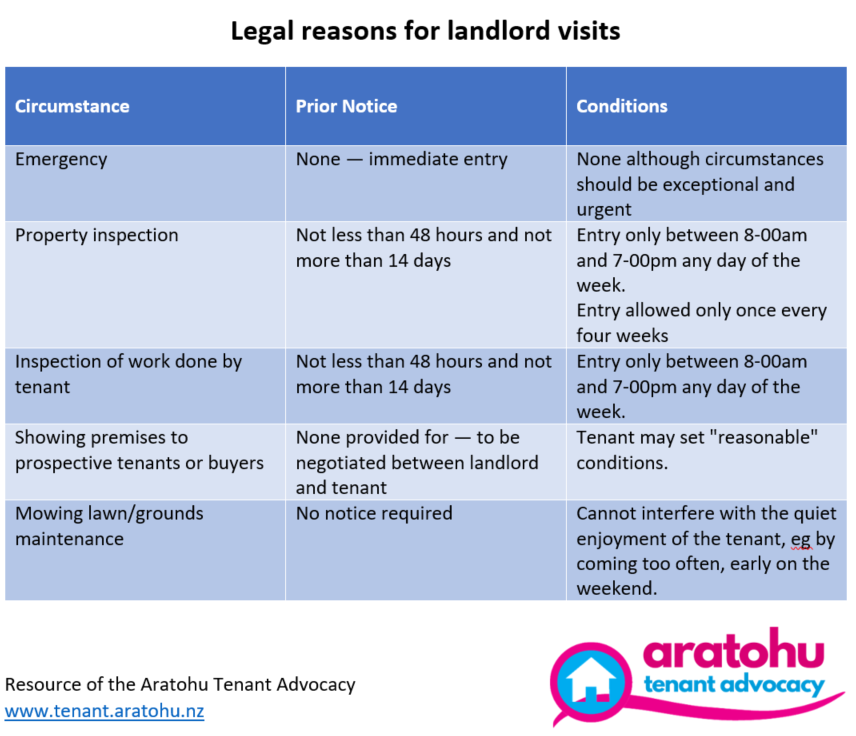At any time with the free consent of the tenant
If the landlord asks permission to enter the house or flat, and the tenant freely consents immediately before or at the time of entry, then no notice period is required (s 48(1)(a) RTA). This can happen at any time of day. The purpose of the visit doesn’t matter, and could include an inspection, repairs or maintenance.
The tenant may not necessarily be at home when consent is requested, eg, the landlord may call or text the tenant and ask if they can enter the house that day to carry out repairs.
The tenant’s permission must be "immediately before or at the time of entry". This means when the landlord is at the door, or shortly before they arrive. A tenant can’t give (and a landlord can’t claim) broad or blanket permission for the landlord to enter the property (eg, at any time, or over a period of days or weeks, or without the required notice). If they do, that permission is invalid and has no legal effect. This is because a tenant can’t waive their rights under the RTA (s 11(3) RTA).
A tenant should feel able to refuse entry to the landlord if they show up at the door. It can be hard to do this in the moment, but some possible words the tenant could use are:
- "We weren’t expecting your visit and now is not a convenient time for you to come in. Would you mind coming back [tomorrow / in a few days’ time]?"
If the landlord insists on coming in the tenant could say:
- "Are you aware of the notice requirements for a landlord visiting their tenants? It’s 24 hours for… and 48 hours for…. It would be great if you could come back then."
In case of emergency
A landlord can enter the house or flat at any time in the case of an emergency. No notice is required. The situation must be exceptional and urgent (s 48(2)(a) RTA).
Property inspection
A notice period of not less than 48 hours, and not more than 14 days, is required for a landlord to carry out a property inspection. A property inspection can be any time between the hours of 8am and 7pm any day of the week. Inspections are only allowed once every four weeks (s 48(2)(b) RTA).
It is lawful for the landlord to inspect the property when the tenant isn’t at home. For more information see Property inspections.
Meth testing
A notice period of not less than 48 hours, and not more than 14 days, is required for a landlord to test for methamphetamine. The landlord has to state what the testing is for (s 48(2)(ba) RTA). The meth testing can take place between the hours of 8am and 7pm any day of the week.
The landlord must give the tenant the results of the test in writing (including if the testing is part of a decontamination process) within 7 days of them receiving the results. Failure to give the tenant the test results can result in a fine or infringement fee of up to $2,000 (s 48(3B) and Schedule 1B RTA).
Inspection of work done by tenant
A notice period of not less than 48 hours, and not more than 14 days, is required for a landlord to enter the property to inspect work that the tenant has said they would do, or was required to do as a result of the tenant’s breach of the tenancy agreement (s 48(2)(c) RTA).
The landlord’s visit can happen between the hours of 8am and 7pm any day of the week.
Repairs and maintenance
A notice period of not less than 24 hours is required for a landlord to enter the house or flat to fulfill their legal duties regarding smoke alarms (s 48(ca) RTA), healthy homes standards (s 48(cb) RTA), or to carry out repairs or maintenance (s 48(d) RTA). The landlord’s visit can happen between the hours of 8am and 7pm any day of the week.
If a tenant has abandoned the house or flat
If the rent is at least 14 days in arrears (overdue), and the landlord has good reason to believe that the house or flat has been abandoned, they can enter the premises after giving at least 24 hours notice to the tenant (s 48(2A) and s 48(2B) RTA).
To show around buyers, real estate agents, etc
Landlords must get the prior consent of the tenant to show around prospective tenants, prospective purchasers, registered valuers, real estate agents, appraisal experts, or any other person who is legally authorised to inspect the premises. They can show them around at any reasonable time (s 48(3) RTA).
The tenant can’t unreasonably refuse to give consent in these situations, but may make their consent subject to reasonable conditions (s 48(3A) RTA). For instance, tenants are allowed to limit access to certain times of the day, or days of the week.
More information on the tenant’s rights when the house is being sold can be found on the Tenancy Services website.

